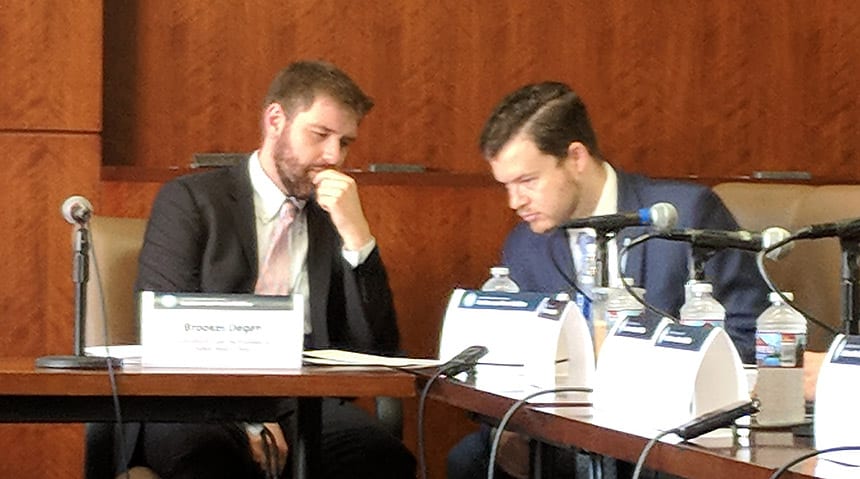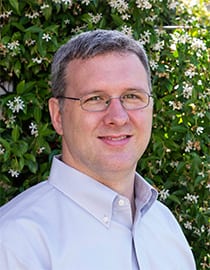
By Andrew Cohen
Who says you can’t mix business with pleasure? For Brookes Degen ’19, a recent project with the Samuelson Law, Technology & Public Policy Clinic did just that.
“It combined two things I really care about: ensuring copyright law doesn’t block otherwise legitimate fair uses, and preserving video games I grew up playing,” he says.
Every three years, the U.S. Copyright Office reviews arguments for exemptions to the anti-circumvention provisions of the Digital Millennium Copyright Act. Groups seek exemptions that would allow them to bypass digital locks and other protections placed on copyrighted works in order to make lawful use of them.
Degen and fellow Berkeley Law students Michael Deamer ’18, Derek Chipman ’18, and Thao Thai ’18 helped Oakland’s Museum of Art and Digital Entertainment (MADE) state its case for preserving online video games that may otherwise be lost to time. Under current rules, it is often legally impossible to preserve such games once publishers deactivate the supporting servers.
Working with Samuelson Clinic supervising attorney Robert Walker, these students conducted extensive research, recruited expert witnesses, and wrote lengthy briefs during both the initial comment and reply rounds. Degen and Deamer also testified on MADE’s behalf and refuted arguments made by the Electronic Software Association, the U.S. video game industry trade association, at a Copyright Office public hearing in Los Angeles.

“For me, the highlight of the public hearing was watching Brookes and Michael elegantly refute our opponents with precise citation to the factual and legal record,” Walker says. “They were pithy and persuasive, and staff members from the Copyright Office congratulated their efforts as being among the best they’d seen from students during the entire proceeding.”
The Copyright Office granted a petition for preserving local-play-only console games in 2015, but this marked the first time a petition was made to cover online games as well. The office is expected to release its findings around the end of October.
“This was particularly exciting for me because I’m passionate about copyright law and strongly believe that museum preservation is critical for us to understand our cultural heritage,” Deamer says.
Full team effort
Thai and Chipman worked on the project during the fall semester, drafting a detailed initial petition. Walker calls them “the architects of our overall strategy” and says they shouldered “much of the heavy lifting in terms of legal and factual research.”
Opponents to their proposed exemption cited the risk of copyright piracy. During the spring semester, Degen and Deamer crafted a reply brief to these and other opposing arguments—which sought to address all potential issues the exemption could potentially raise—in a tight four-week window.
“It was a lot to cover, which definitely added to the pressure,” Degen says. “The brief needed to enable everything our client wanted to preserve in the next three years and every argument needed to be as strong as possible.”
The students emphasized how preserving online video games that MADE is considering preserving—such as Star Wars Galaxies, The Matrix Online, and Neverwinter Nights—constitutes a protected fair use of the copyrighted works. They also noted that the games are in jeopardy of becoming unrecoverable due to things such as bit rot, the slow deterioration in the performance and integrity of data kept on storage media.
“Our responses were focused on how the exemption is meant to be a stopgap that prevents old games from being lost,” Deamer says. “There’s no need to preserve popular games since they’re actively maintained by the copyright owner.”
Deamer’s parents, who live near Los Angeles, watched him and Degen convey those arguments at the public hearing. Deamer calls testifying there “a fantastic experience because we were able to showcase the amazing work our client does while verbalizing some of our legal arguments to the Copyright Office. … It was satisfying to have a great team experience in law school.”
And satisfying for clinic leaders to see their students take full command of the issues throughout the school year—from Thai and Chipman developing core arguments to Deamer and Degen honing and amplifying them at the public hearing.
“They were instrumental in every step of the process, both tactically and strategically,” Walker says.